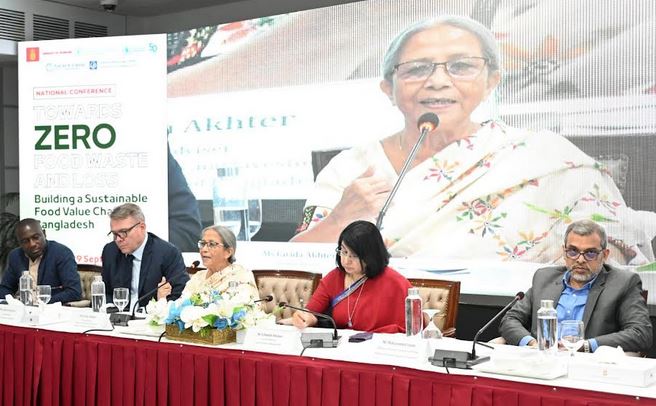News Flash

DHAKA, Sept 29, 2025 (BSS)- A coalition of international bodies and domestic policy experts have called for strategic action to combat Bangladesh's severe Food Loss and Waste (FLW) crisis, which sees an estimated 34 per cent of all food produced either lost or wasted.
This crisis carries immense consequences, equivalent to 4 per cent of the nation’s GDP, while contributing 13 per cent of its greenhouse gas emissions and utilizing 27 per cent of its land for food that is never consumed.
The dire statistics and potential solutions were the focus of a high-level conference titled 'Towards Zero Food Waste and Loss: Building a Sustainable Food Value Chain in Bangladesh,' co-organised by the Centre for Policy Dialogue (CPD), the Royal Danish Embassy in Dhaka, the Food and Agriculture Organization (FAO), the World Bank, and the World Food Programme (WFP) at a hotel in the city.
Speakers at the conference detailed the massive environmental and economic toll of the wastage.
Farida Akhter, Adviser of the Ministry of Fisheries and Livestock stressed the importance of tackling food waste to ensure food security in Bangladesh.
“Despite impressive growth, Bangladesh still suffers from malnutrition, particularly among women, and food distribution remains unequal. Therefore, the reduction of food waste and loss is a critical step for Bangladesh to ensure food security,” she added.
The adviser also highlighted the challenges farmers face, stating, “Farmers often struggle to produce food with little support for storage, pricing, or infrastructure. When they do store their production, they lack adequate price support, leading to waste.”
The adviser called for greater support and better infrastructure to help reduce food loss and improve the country’s food security.
Mohammed Yasin, Additional Secretary, Administration Wing, Ministry of Food, remarked that Bangladesh is losing soil fertility, money, water, and labour, while producing less food for the poor and marginalised.
The opportunity cost is immense, and limited food choices are being created for the population, he added.
Anders Karlsen, the Charge D’Affairs at the Embassy of Denmark in Bangladesh, emphasised the global scale of food loss, stating, “One-third of all food produced is either lost or wasted, using land larger than China to produce food no one will eat.’ He further discussed the economic impact, saying, ‘It’s not just the food that’s wasted; farmland and greenhouse gases are also lost during production and transportation.”
Karlsen also stressed the need for urgent action, urging, “The best time to act is today. If not yesterday, then today.”
While addressing the issue of food loss and waste, Dia Sanou, Deputy FAO Representative, explained the global and local implications of food waste, stating, “The world produces enough food to feed more than 1.5 times the global population, yet food insecurity and malnutrition persist due to unequal distribution, poor infrastructure, and, most importantly, food waste and loss. Despite a surplus, food waste prevents sufficient food from reaching those most in need.”
Jesse Wood, Deputy Country Director, Office in Charge, WFP Bangladesh, highlighted the scale of food loss in Bangladesh, with studies showing “8-15 per cent of rice lost after harvest and 20-40 per cent of fruits and vegetables wasted, valued at US$ 2.4 billion.”
He pointed out that despite Bangladesh being a food production powerhouse, producing significant amounts of vegetables, fish, and essential goods, constraints in storage and cold chains lead the country to import the very products it produces, a missed opportunity for both farmers and the economy.
The Executive Director of CPD, Dr Fahmida Khatun, noted the environmental impact, saying, “If we are increasing food waste and loss, we are draining scarce environmental resources. Bangladesh is one of the most vulnerable countries to the impact of climate change, making it imperative that we reduce food waste.”
The first panel session, titled ‘Policy and Regulation,’ focused on the role of the government in establishing regulatory frameworks for waste reduction and the connection to Bangladesh’s updated National Food Systems Pathways.
The discussion also highlighted incentives for both the private and public sectors to reduce food loss and waste.
At the discussion, Dr Samina Yasmin, Senior Agriculture Specialist, The World Bank, stressed the importance of addressing the issue strategically, urging, “We first need to get the government on board, not just acknowledging the problem, but committing to action. We also need to involve the private sector to scale up interventions.”
The second panel session, titled ‘What Can We Do and How to Take Action,’ focused on promoting cold chain logistics and smart packaging solutions for post-harvest loss reduction. The discussion also explored working with traceability to minimise losses in the value chain, as well as the importance of private-public partnerships to reduce food loss and waste. Additionally, the session highlighted the need to incorporate a focus on reducing food loss and waste into current initiatives and ongoing work.